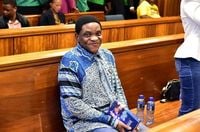JOHANNESBURG — Televangelist pastor Timothy Omotoso was rearrested on May 10, 2025, just days after he was acquitted of serious charges including rape, human trafficking, and sexual assault by the Gqeberha High Court. The court's decision on April 2, 2025, found that the prosecution had failed to prove its case beyond a reasonable doubt, leading to a controversial acquittal that sparked widespread debate across South Africa.
Omotoso, who leads the Jesus Dominion International (JDSI) church, was apprehended in East London, Eastern Cape, by officials from the South African Police Service (SAPS) and the Immigration Inspectorate of the Department of Home Affairs. The arrest was confirmed by SAPS National Police Commissioner Fannie Masemola, who stated that the charges are related to immigration violations. "Members of the Department of Home Affairs and police arrested Omotoso. He will surely appear in court on Monday, and everybody will know what charges he is facing, but it is immigration-related matters," Masemola said.
Following his acquittal, Omotoso's legal troubles seemed far from over. He had faced a total of 63 charges alongside his co-accused, Lusanda Sulani and Zukiswa Sitho, who were also found not guilty. The trio had been accused of recruiting young girls to stay at mission houses where Omotoso allegedly sexually assaulted them. The case had garnered significant media attention and public scrutiny over the years, culminating in a trial that highlighted issues of gender-based violence and the efficacy of the South African justice system.
Public reaction to Omotoso's acquittal was mixed. Many South Africans expressed outrage and disbelief, questioning how he could be cleared of such serious allegations only to be rearrested shortly after. Social media users voiced their frustrations, with one commenter noting, "Only in South Africa do we clear your name, clap for you in court, and then pick you up like you stole bread from Shoprite. Acquitted yesterday, arrested today. Our justice system runs on vibes and plot twists." Others echoed similar sentiments, suggesting that the situation felt like an abuse of power.
Gender rights activists and victims' advocacy groups were particularly vocal following Omotoso's acquittal. One activist, Onele Deleki, criticized the public celebrations that followed his release, stating, "The justice system is so messed up, and we're so tired of the same thing over and over. Perpetrators are being favoured and victims are being left in the cold like they do not matter." This sentiment reflects a broader concern about how the justice system handles cases of sexual violence and the treatment of victims.
Omotoso's case is not just a legal battle but a reflection of the ongoing struggle against gender-based violence in South Africa. The country has seen a surge in awareness and activism surrounding these issues, particularly in the wake of high-profile cases that have drawn attention to the inadequacies of the system. The fact that Omotoso was acquitted, despite the serious nature of the allegations, left many questioning the integrity of the legal process.
The Gqeberha High Court's ruling, delivered by Judge Irma Schoeman, stated that the state had not met the burden of proof required to convict Omotoso and his co-accused. "In my view, the explanations of the accused are improbable, and I don’t subjectively believe them,” Schoeman remarked, underscoring the complexities and challenges faced by prosecutors in cases of this nature.
As the news of Omotoso's rearrest unfolds, SAPS officials have indicated that a formal media briefing will be held to clarify the specifics of the new charges. The public is eagerly awaiting further details, especially given the high-profile nature of the case and its implications for ongoing discussions about justice and accountability in South Africa.
In the meantime, the situation remains fluid, with many watching closely to see how the legal proceedings will develop. Omotoso is scheduled to appear in court again on May 12, 2025, where he will face the new immigration charges. This latest twist in his legal saga serves as a reminder of the ongoing complexities surrounding justice for victims of sexual violence and the challenges faced by law enforcement in addressing these issues effectively.
As the story continues to develop, it highlights the delicate balance between legal rights and the need for justice in a society grappling with the legacy of gender-based violence. The discussions surrounding Omotoso's case will likely persist, as advocates push for reforms to ensure that victims are heard and that perpetrators are held accountable.


